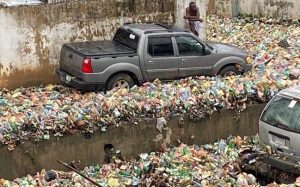The Environmental Rights Action/Friends of the Earth Nigeria (ERA/FoEN) and member organisations of the Global Alliance for Incinerator Alternatives (GAIA) have expressed concern over the recent suspension of Green Taxation on Single-Use Plastics (SUPs) by the Federal Government, cautioning that it will make Nigeria a dumping ground for plastic waste products.

Their reaction follows the recent announcement by the Federal Government suspending the Green Taxation which imposes an Excise Tax on SUPs, including containers and bottles.
The suspension is supposedly in line with the current administration’s commitment to create a business-friendly environment.
The tax was introduced as part of the government’s efforts to address the growing concern over the impact of plastic waste on the ecosystem.
The Executive Director of ERA/ FoEN, Chima Williams, said that the new development would only bring to fruition the ominous prediction that plastic products in the ocean will surpass the number of fish in the water by 2040.
According to him, the Nigerian government is supposed to enact policies that will put an end to the invasion of plastic on our oceans and water bodies, not promoting policies and laws that increases the production of more plastic.
“At a time like this when the world is set on improving the consciousness of the public on the need to end the use of plastic, it is unfortunate that our president is increasing the importance of plastic products, when Nigeria is being ravaged by a plastic tsunami.
“Nigeria is supposed to be signing a law that promotes the phase out of plastic. This suspension may seem that the government is not committed to the implementation of the Paris Agreement on the reduction of the impact of climate change from the waste sector.”
He called on the government to deliberately programme itself into a zero-waste society where no waste is generated, or all wastes generated are seen as resources.
Also speaking on the issue, the ERA/ FoEN Project Officer of Waste Management, Melody Enyinnaya, pointed out that green taxations are eco/environmental tax, foisted on activities that pollute the environment, as SUPs have become major pollutants of the environment.
According to her, green taxation on SUPs incorporates the negative expanse of the adverse effects of SUPs on the environment and the idea surrounding green taxes is to increase production costs for corporations, thereby bringing about higher prices on plastics, which will have the effect of discouraging consumers from purchasing them, further reducing their pollution rate on the environment.
“The key implication here is that this suspension will impede the efforts in reducing SUPs pollution, especially for a country like Nigeria that do not have effective policies guiding SUPs production, consumption and disposal.
“The government should revisit the suspension of green taxation, while considering the environmental and health implications of such polices at heart.”
She further advised the government to look at developing legislative instruments like a withdrawal policy that will hold these corporations accountable for their product waste.
On his part, the Executive Director of Sustainable Research and Action for Environmental Development (SRADeV), Dr Leslie Adogame, however, opined that an outright ban is the solution to the production of plastic waste in Nigeria.
He affirmed that only an outright ban and tax approach with a robust Extended Producer Responsibility programme will help to arrest plastic pollution in Nigeria.
The Executive Director of Centre for Earth Works (CFEW), Benson Dotun Fasanya, added that the suspension of green tax on plastics is an open door to a plastic tsunami in Nigeria.
